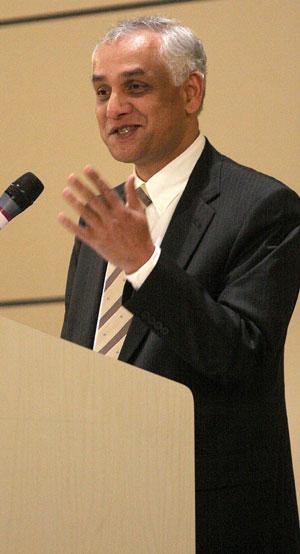Pramod P. Khargonekar, dean of the College of Engineering at the University of Florida, spoke about the role of the university as a distributor of knowledge that’s faced with the challenge of competing in an increasingly innovative and technological global market.
“”The availability of cheap technology is changing the way people learn and live,”” he said. “”What happens in China or Russia affects what happens here in the U.S. and we are at the beginning of this aim, rather than at the end.””
Khargonekar graduated from the Indian Institute of Technology, in Bombay, and has been a professor of electrical engineering and computer science at the University of Michigan and the University of Florida, where he has been dean of the College of Engineering since 2001.
Khargonekar said his experience as a leader in education taught him that all universities are trying their best to recruit the best faculty and students in order to stay competitive. That competition has become more of a global focus as other countries realize that the success of the American economy is a result of the emphasis placed on higher education.
“”Since the U.S. is not the only one in this business, rising costs and access has become a major issue,”” Khargonekar said.
Public support for universities remains a challenge, he said, adding that a university’s strategic plan should focus on increasing public support and maximizing the revenue base.
Eva Gonzales, a member of the UA’s Staff Advisory Council, asked Khargonekar what he would do, given the decreasing level of state support for the UA, to help the staff with the demand for resulting budget cuts.
“”Staff are the unsung heroes of the university,”” Khargonekar said. “”Any cuts that are below a certain level won’t allow the complete function of a university, so finding that balance-of where to draw the line on cuts-would be the backbone of the operation.””
Khargonekar said he was in the midst of dealing with a budget cut at the University of Florida, and has made two previous ones in his administrative career.
The most important aspect is preventing the harm inflicted on academics, he said.
“”Am I a magician? No. Do some people get hurt? Yes. But the guiding light-and it’s how I go to sleep at night- is whether or not this decision will make us a better college in the long run,”” he said.
René d’ Almedia, chair of the French and Italian department, asked Khargonekar what he thought about the role of humanities in a university, given his background in science and mathematics.
The crowd laughed when Khargonekar responded by saying,”” What does an engineering scholar like me know about humanities.””
Khargonekar served as the co-chair of a task force on the state of humanities at the University of Florida and currently serves as the chair of the university’s search committee for the dean of the College of Liberal Arts and Sciences.









